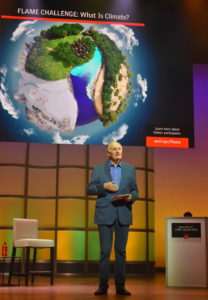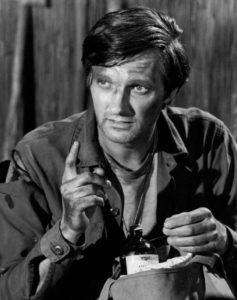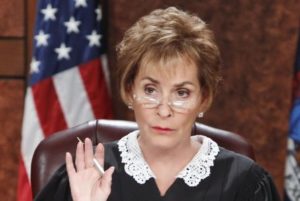When the ORBITER team visited the World Science Festival, we got schooled by a few 11-year-olds.
No, really. Well-known scientists from around the world flocked to New York for the annual event, discussing everything from quantum physics to extraterrestrial life to the power of music. But at one particular seminar, a packed auditorium listened to a trio of fifth-graders explaining the meaning of climate.

At the Flame Challenge
They were taking part in the Flame Challenge, an annual contest in which scientists are asked to explain a basic scientific concept simply and clearly enough that an 11-year-old can understand. This year’s challenge: What is climate? The three adult winners were joined on stage by three local schoolchildren to break it down.
The Challenge was conceived by Alan Alda, the actor most famous for playing “Hawkeye” Pierce on the award-winning TV sitcom M*A*S*H. The idea for the Challenge stems from a childhood incident in which 11-year-old Alan asked his tutor to explain a flame. The teacher simply said, “It’s oxidation,” and left it at that, leaving a curious boy unsatisfied and thirsty for more.
That incident stuck with Alda into adulthood, where his curiosity, especially about science and how things work, never waned. It helped him be a more informed “doctor” on M*A*S*H (where he wrote 19 episodes), to host (for 15 seasons) the popular PBS series Scientific American Frontiers, and, most recently, to found the Alan Alda Center for Communicating Science. He is also the author of three best-selling books, including If I Understood You, Would I Have This Look On My Face? My Adventures in the Art and Science of Relating and Communicating (Random House.)
As an actor, Alda, 82, always understood the importance of clear communication. But ever since that childhood query about the flame, he’s also wished that scientists, doctors, and other professionals were better explainers. The Alda Center aims to “empower scientists and health professionals to communicate complex topics in clear, vivid, and engaging ways; leading to improved understanding by the public, media, patients, elected officials, and others outside of their own discipline.”
We caught up with Alda shortly after the World Science Festival to talk about these things.
ORBITER: Before we begin, and you may get tired of hearing this, I just want to thank you for M*A*S*H. What a wonderful show, and still relevant today.
Alan Alda: Well, thank you. We were all lucky to be together, and it was an unusual chance for all of us to do something that was pertinent to all of our lives.
Okay, the Flame Challenge. Let’s go back to your childhood when your teacher gave you that lame answer to your question. What do you remember about that?
I was curious about how things worked, and I asked her, “What’s a flame?” She just said, “It’s oxidation.” She didn’t know how to answer that in a way that took into account my age and curiosity, but unfamiliarity with technical terms. Technically, that’s at least part of an answer, but it doesn’t begin to explain it to somebody who had never heard of oxidation before.
But I don’t blame her. She was suffering from what we all suffer from at times, which has been called “the curse of knowledge.” That’s where you understand something at such depth and in such detail that you forget what it’s like to hear about it for the first time.
Did that motivate you at the time to be more interested in science? Or did that turn you off?
I think it may have turned me off from asking her questions! But it didn’t stop my curiosity. I stayed curious.
 Let’s fast forward. When you were playing a doctor on M*A*S*H, how did that dovetail with your interest in science and biology and the way things work?
Let’s fast forward. When you were playing a doctor on M*A*S*H, how did that dovetail with your interest in science and biology and the way things work?
I approached it from the point of view of a writer and an actor. I needed to know how the operations worked, what the dangers were, that kind of thing, because I needed the story to be a good story but to be accurate at the same time. So my habit of asking questions was helpful. [M*A*S*H’s writers consulted with physicians on their scripts.]
That relentless curiosity served you well on Scientific American Frontiers.
Yes. I interviewed hundreds of scientists for the show, and I began to realize that when I did it well, they weren’t conventional interviews that I had really prepared for. They were just conversations in which I was very curious. That is when I began to realize that maybe we could teach scientists to have a connection with the general public—from the connection that I had with them.
My interactions with them were kind of like an improvisation. What if we taught these scientists improvisation as a first step to learning about better communication? I experimented with that, and it was working. And that’s now the basis of how we train scientists, doctors, engineers, and so on to communicate science to the public or to their patients.
It seems like the art of communicating science well includes the art of storytelling.
Storytelling is very important. I think the bedrock basis of it is being able to figure out what’s going on in the audience’s mind as you try to communicate with them. If they’re with you on technical talk, that’s good—if you’re a scientist talking to other scientists. But if they’re in other disciplines and they understand a whole other jargon—or if they’re just a general audience—it’s dangerous to talk to them in your jargon, because it can be easily misunderstood.
I’ve seen it happen. I know examples where a lot of time is wasted because both parties didn’t use the same words in the same way. So this not only helps in talking to other scientists across disciplines, but in talking to the public too. And it helps in teaching. But the basis of it is to know your audience as well as possible.
Tell me about The Alda Center and why you founded it.
We’re coming up on our 10th year, and we’ve made an enormous amount of progress in that time. We’ve trained more than 12,000 scientists and medical people across the country and in about five other countries.
I helped start it because I thought that if we trained young scientists to communicate while they were becoming scientists, they’d have a tool essential to science—good communication.
As time went on, we realized we could also work with senior scientists who were already out on the front lines of communication. Communicating science well is more urgent than ever. We still train graduate students, but they won’t be on the front lines for another 10 years or more. So we’re training senior professionals now too, including people who don’t necessarily work with patients on a daily basis, but have to inspire other physicians to do their work in a safe and efficient way. That takes communication.
Why is communicating science well is more urgent than ever?
Because it’s more and more difficult to get funding for the sciences. Because science itself is mistrusted in the highest places.
It’s also difficult to get funding for collaboration across disciplines. This is where new discoveries are going to come from.
There’s an urgent need for scientists to be able to collaborate better, and that takes good communication.
This increases people’s ability to work in teams, even within the same discipline. Within the same lab, teamwork improves. And that could translate into more funding.
You said science is mistrusted in the highest places. That seems particularly true of the current administration and the number of climate change deniers.
It’s mystifying to me. What surprises me is that this administration says they want to be responsible to business, but they’re doing nothing about climate change. But various industries are aware of the problem and are shifting funds into efforts to do something about climate change. Those industries see that it’s not only good for humanity, but I’m sure they see it in a dollars and cents way as well. When you politicize science, it’s not good.
I’m very leery of politicizing this issue. It’s not good that it’s politicized by climate change deniers. Maybe it gets them a certain number of votes, but it’s not in anybody’s interest.
There’s probably more money to be made ultimately in clean energy than fossil fuels. Our government is supposed to be in charge of the overall picture, to help things. But when you factor in the cost of an increase in cancers and deaths from other health issues impacted by climate change, when you take into account the engineering that has to go into cities being hit by rising sea levels, there’s an enormous cost that doesn’t need to be paid if we act sooner than later. But that’s not in the interest of some people.
Can you recall a particular scientific discovery really blew your mind?
Yeah—the microbiome. I’m just amazed by that. It’s almost like having another organ. The bacteria in our gut affects our brain more than we knew until a few years ago. And there are way more bacterial cells that make us who we are than human cells. The variety is amazing, and we’re living in close relationship with these animals, and we know so little about them. The idea that the microbes in the palm of my hand are more like the microbes in the palm of your hand than they are like the ones in the crook of my own elbow, that’s fascinating to me.
And we’re not just carriers of them. We’re dependent on them. We have a symbiotic relationship that’s a life-and-death one. Some of them are at war in our bodies. Not all of them. It’s really interesting.
Anything else on your mind these days?
It would be really nice if you could mention my new podcast, Clear + Vivid. It’s an entertaining show of conversations with really interesting people that touch on stories about communication and relating. I’m approaching it from a lot of different angles. It’s not just science. I’ve talked with Sara Silverman, Itzhak Perlman, Judge Judy, and at one point, I’ll be talking to a hostage negotiator. Different aspects of how communication is vital and what unusual techniques have worked for these very interesting people. And all advertising proceeds will go to the Center for Communicating Science.

(CBS)
Judge Judy? Really?
Yes! We talked about how to figure out when someone is telling the truth. A very interesting conversation!